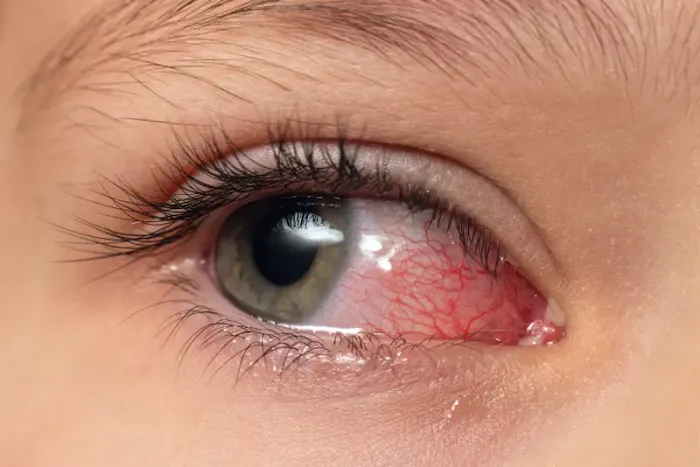Guide to Eye Flu Conjunctivitis
Discover a complete guide to eye flu (conjunctivitis) including its causes, symptoms, treatment, and prevention tips. Learn how to manage this common eye infection effectively.

Written by Dr. Rohinipriyanka Pondugula
Reviewed by Dr. J T Hema Pratima MBBS, Fellowship in Diabetes Mellitus
Last updated on 13th Jan, 2026

That unmistakable feeling of grit, the alarming pink hue, and the relentless itch—if you’ve ever experienced conjunctivitis, commonly known as eye flu, you know how disruptive it can be. More than just a minor irritation, this inflammation of the conjunctiva (the clear tissue covering the white part of your eye) is one of the most common eye conditions worldwide, affecting millions every year.
Whether it's caused by a virus, bacteria, or an allergen, knowing how to identify, treat, and prevent its spread is crucial for your health and the well-being of those around you. This comprehensive guide will walk you through everything you need to know about eye flu, from distinguishing the different types to effective home remedies and when it's absolutely essential to see a doctor. Let’s clear up the confusion and get you on the path to recovery.
Defining the Inflammation
Eye flu is the common layman's term for conjunctivitis. It refers to the swelling or inflammation of the conjunctiva. This thin, transparent membrane lines the eyelid and covers the sclera (the white part of the eyeball). When the small blood vessels in the conjunctiva become inflamed, they expand and become more visible. This is what causes the whites of your eyes to appear pink or reddish, hence the more common name, "pink eye."
Consult a Top Ophthamologist
How Common is It?
Conjunctivitis is extremely common. It is one of the leading reasons people visit primary care doctors, pediatricians, and even emergency rooms for eye-related issues. While it can affect anyone regardless of age or gender, certain types, like viral and bacterial conjunctivitis, are more prevalent in children due to their close contact in schools and daycares.
The Different Types of Conjunctivitis
Understanding the type of conjunctivitis you have is the first step to effective treatment, as the causes and remedies differ significantly.
1. Viral Conjunctivitis
This is the most common form, often associated with the "common cold." It's caused by viruses like adenovirus and is highly contagious. It typically starts in one eye and can easily spread to the other. Watery, itchy eyes are a hallmark symptom.
2. Bacterial Conjunctivitis
Caused by bacteria such as Staphylococcus aureus or Streptococcus pneumoniae, this type is also very contagious. It often results in a thick, yellow or greenish discharge that can cause the eyelids to stick together, especially after sleep.
3. Allergic Conjunctivitis
This type is triggered by allergens like pollen, dust mites, or pet dander. It is not contagious. Symptoms usually affect both eyes and include intense itching, tearing, and swelling. It often occurs seasonally alongside other allergy symptoms like sneezing and a runny nose.
4. Giant Papillary Conjunctivitis (GPC)
This is a more severe form of allergic conjunctivitis often linked to the chronic use of contact lenses or an artificial eye (ocular prosthesis).
Recognizing the Symptoms: Is it Pink Eye?
Symptoms can vary based on the cause, but general signs of conjunctivitis include:
Redness in one or both eyes
A gritty feeling, like sand is in your eye
Itchiness (especially prominent in allergic types)
A discharge that forms a crust during the night, potentially sealing your eye shut
Tearing/watery eyes
Viral vs. Bacterial Symptom Checker
Viral: Watery discharge, often starts with a cold or respiratory infection.
Bacterial: Thick, pus-like discharge that is yellow, green, or white.
How is Eye Flu Diagnosed?
A doctor can typically diagnose conjunctivitis through a simple eye exam. They will ask about your symptoms, recent health, and potential exposure. In some cases, especially if the infection is severe or recurrent, they may take a sample of the eye discharge for laboratory analysis to identify the specific virus or bacteria causing the problem. This helps in prescribing the most effective treatment.
Effective Treatment Options for Conjunctivitis
Treatment is entirely dependent on the type of conjunctivitis.
Treating Viral Conjunctivitis
Unfortunately, there is no cure for viral conjunctivitis; it must run its course, much like a common cold, which can take 2 to 3 weeks. Treatment focuses on relieving symptoms:
Cool compresses: Apply a clean, wet washcloth to closed eyelids to soothe irritation.
Artificial tears: Over-the-counter lubricating eye drops can help relieve dryness and discomfort.
Antihistamine drops: Can help reduce itching.
Important Note: Antibiotic eye drops are ineffective against viruses.
Treating Bacterial Conjunctivitis
This type is typically treated with prescription antibiotic eye drops or ointments. Symptoms often begin to improve within 2-3 days of starting antibiotics, but it's crucial to complete the entire course of medication to prevent recurrence.
Managing Allergic Conjunctivitis
The best treatment is to avoid the allergen, though this isn't always possible. Effective management includes:
Antihistamine or mast-cell stabilizer eye drops (e.g., ketotifen, available over-the-counter).
Oral antihistamines for overall allergy relief.
Decongestant eye drops (should be used short-term only).
Cool compresses to soothe the eyes.
Home Remedies and Soothing Practices
Alongside medical treatment, these home care tips can provide significant relief:
Practice Good Hygiene: Wash your hands frequently with soap and water. Avoid touching or rubbing your eyes.
Use Clean Linens: Change pillowcases, sheets, and towels daily while infected.
Warm or Cool Compresses: Use a clean cloth soaked in warm water to gently loosen crusty discharge (bacterial). Use a cool compress to reduce itching and swelling (viral/allergic).
Stop Wearing Contacts: Switch to glasses until your doctor says it's safe to resume lens use.
Discard Contaminated Makeup: To prevent re-infection, throw away any eye makeup you used while infected.
How Contagious is Eye Flu? Prevention is Key
Viral and bacterial conjunctivitis are extremely contagious. They spread through:
Direct or indirect contact with the discharge from an infected person's eye.
Touching contaminated surfaces (doorknobs, countertops) and then touching your eyes.
Sharing personal items like towels, washcloths, eye drops, or makeup.
Key Prevention Strategies
Do not share personal eye care items or cosmetics.
Wash your hands thoroughly and often.
Cover your mouth and nose when coughing or sneezing.
Disinfect common surfaces like phones, keyboards, and countertops.
If you are infected, stay home from work, school, or public places until you are no longer contagious (often 24-48 hours after starting antibiotics for bacterial cases, or while symptoms are active for viral).
When to See a Doctor: Red Flags
While most cases of conjunctivitis are mild, certain symptoms warrant immediate medical attention. Contact your doctor or seek emergency care if you experience:
Severe eye pain or a headache.
Sensitivity to light (photophobia).
Blurred vision that does not improve after blinking.
Intense redness in the eye(s).
Symptoms that worsen or do not improve after a week.
A weakened immune system from HIV, cancer treatment, or other medical conditions.
Conjunctivitis in Children and Newborns
Conjunctivitis is very common in children due to their close contact in schools. The same rules of hygiene and contagion apply. However, conjunctivitis in a newborn baby is a serious medical concern and requires immediate attention from a pediatrician, as it could be a sight-threatening infection acquired during birth.
Conclusion
Dealing with eye flu can be an uncomfortable and frustrating experience, but armed with the right knowledge, you can manage it effectively. Remember, accurately identifying whether your pink eye is viral, bacterial, or allergic is the cornerstone of proper treatment. While home remedies and over-the-counter solutions can provide significant relief, never hesitate to consult a healthcare professional for a precise diagnosis, especially if symptoms are severe or persistent. By practicing good hygiene and being mindful of contagion, you can not only speed up your own recovery but also protect your friends, family, and colleagues. Your vision is precious, take care of it.
Consult a Top Ophthamologist
Consult a Top Ophthamologist
Dr. Venkateswaran Sivaprakasam
Ophthalmologist
42 Years • MBBS, Diploma in Ophthalmology
Tiruvannamalai
Shiva Eye And General Hospital, Tiruvannamalai
Dr. Padmini S
Ophthalmologist
4 Years • MBBS,MS
Bengaluru
Apollo Medical Center, Marathahalli, Bengaluru
Dr. Akashdipta Saha
Ophthalmologist
4 Years • MBBS, MD(Ophthalmology), Fellowship in Retina & Vitreous
Delhi
AIIMS, Delhi

Dr. Arpita Agrawal
Ophthalmologist
20 Years • MBBS MS FLUPEI
Bhopal
Apollo Sage Hospitals, Bhopal

Dr. Shivani Grover
Ophthalmologist
9 Years • MS (Ophthalmology), Fellowship Cataract, Squint & Paediatric Ophthalmology
Lucknow
Apollomedics Super Speciality Hospital, Lucknow




